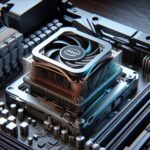Bow Down: Why the Ryzen 7 9800X3D Isn’t Just King – It’s the Gaming God-Tier CPU
Alright, let’s cut through the noise. If you’re building a new gaming PC in 2025 and you’re not laser-focused on the AMD Ryzen 7 9800X3D, you might seriously need to re-evaluate your priorities. Forget incremental upgrades; this chip isn’t just a step forward, it’s a giant leap that leaves everything else scrambling in the dust. I’ve been planning my next build, agonizing over every component, but the CPU slot? That decision became crystal clear the moment the details on the 9800X3D solidified. This isn’t just hype; it’s the raw, unadulterated truth for anyone who demands the absolute pinnacle of gaming performance.
Deconstructing Dominance: What Makes the 9800X3D Untouchable
Let’s break down the raw power. We’re talking 8 cores and 16 threads of pure, unadulterated Zen 5 architecture. Some might try to sell you on higher core counts, but let’s be real: for gaming, 8 cores is the undisputed sweet spot. It’s the perfect balance, delivering insane single-core performance where games actually need it, while having more than enough multi-threaded muscle to crush background tasks without breaking a sweat. Anything more for a pure gaming build right now? Unnecessary baggage.
But the cores are only half the story. The real magic, the secret sauce that makes competitors weep, is AMD’s absolutely genius second-generation 3D V-Cache. This chip packs a ludicrous 96MB of L3 cache, with a whopping 64MB stacked vertically using that 3D V-Cache tech. Forget slow trips to system RAM; this CPU has a Fort Knox of frequently used game data sitting right there, accessible almost instantaneously. The result? Latency plummets. Stutters vanish. Minimum frame rates skyrocket. This isn’t just numbers on a benchmark chart; it’s the tangible feel of perfectly smooth, responsive gameplay that you simply cannot get anywhere else. It’s AMD playing chess while everyone else is playing checkers, specifically optimizing for the biggest bottleneck in modern gaming.
And the speed? Oh, the glorious speed! A 4.7 GHz base clock is fantastic, but that boost clock hitting up to 5.2 GHz? That’s pure rocket fuel for your frame rates. This thing screams. But here’s the kicker, the part that shows AMD truly getsenthusiasts: full overclocking support. Remember how previous X3D chips were locked down? AMD listened. They delivered. Now, not only do you get the best out-of-the-box gaming performance thanks to the V-Cache, but you have the freedom to push it even further if you’ve got the cooling and the know-how. It’s the best of both worlds, a level of trust and flexibility you might not find elsewhere.
The Foundation for Glory: AM5, DDR5, PCIe 5.0 – No Compromises
This beast lives on the AM5 socket, AMD’s forward-thinking platform that sets the standard for the future. Compatibility is massive, spanning the latest X870/X870E down to the excellent B650/B650E and prior X670 series chipsets. This means you can build a god-tier machine without being forced into only the most expensive motherboards (though those X870E boards are calling my name…).
Crucially, AM5 means DDR5 memory support, and the 9800X3D handles up to 5600 MHz with ease (and likely much higher with tuning). Forget sluggish DDR4; the bandwidth and speed improvements of DDR5 are essential for feeding a high-performance CPU like this, ensuring no bottlenecks hinder its path to glory. And PCIe 5.0? Absolutely non-negotiable for a top-tier build in 2025. Double the bandwidth of PCIe 4.0 means your next-gen GPU and NVMe SSDs run completely unleashed, no questions asked. Building on AM5 with the 9800X3D isn’t just building for today; it’s securing dominance for years.
Now, let’s talk power and heat. A 120W TDP might sound like a lot, but for the earth-shattering performance this chip delivers? It’s remarkably efficient. Competitors might need to guzzle more power to even try and keep up in games, often failing anyway. And AMD’s clever inverted 3D V-Cache design – putting the heat-sensitive cache under the cores – is a masterstroke in thermal engineering. It allows for better cooling contact on the cores themselves, enabling those higher clocks and better overclocking potential. It’s smart design, plain and simple, addressing a key challenge head-on. The integrated Radeon graphics? Sure, they’re there – useful for troubleshooting, but let’s be honest, anyone buying this chip is pairing it with a monster dedicated GPU. It’s a nice-to-have, but the real story is the core gaming performance.
Why Settle for Less? The Undeniable Case for the 9800X3D
Look at any reputable review, any benchmark chart focused on actual gaming. The Ryzen 7 9800X3D consistently sits at the absolute peak. It trades blows with, and often outright demolishes, even more expensive CPUs in the scenarios that matter most to gamers. That massive cache just obliterates gaming bottlenecks in a way raw clock speed or core count alone cannot.
- Unrivaled Gaming Performance: This is its entire reason for existing. Nothing touches it for pure gaming FPS and smoothness.
- Revolutionary 3D V-Cache: AMD’s “cheat code” for gaming dominance. Reduces latency where it counts.
- Blazing Clock Speeds + Overclocking: Fast out of the box, with headroom for enthusiasts to push boundaries.
- Future-Proof Platform: AM5 with DDR5 and PCIe 5.0 ensures longevity.
- Smart Thermal Design: The inverted cache shows intelligent engineering for better cooling.
- Gamer-Focused Efficiency: Incredible performance without an outrageous power draw compared to the output.
The Final Word: It’s Not Even a Choice Anymore
For someone like me, planning a no-compromise gaming build, the discussion around the CPU slot is effectively over. The AMD Ryzen 7 9800X3D isn’t just leading the pack; it is the pack. It represents the absolute zenith of current gaming CPU technology, meticulously engineered to deliver the smoothest, fastest, most responsive experience possible. Any other choice feels like willingly leaving performance on the table.
Alternatives to AMD Ryzen 7 9800X3D (Gaming Focused, ~ $479 Tier):
-
Intel Core i7-14700K / KF:
- Strengths: Offers more cores/threads (20 cores / 28 threads) than the 9800X3D, leading to stronger performance in multi-threaded productivity tasks. It’s also often competitive in price. Supports DDR4 and DDR5, offering potentially cheaper motherboard/RAM options.
- Weaknesses: Generally falls short of the 9800X3D in pure gaming performance due to lacking the large L3 cache advantage of 3D V-Cache. It also tends to draw more power and run hotter. Uses the older LGA 1700 socket, which is at the end of its life cycle.
- Ideal For: Users who need strong productivity performance alongside very good (but not absolute top-tier) gaming performance, potentially saving some money or utilizing existing DDR4 RAM.
-
AMD Ryzen 7 7800X3D:
- Strengths: The direct predecessor. Still offers phenomenal gaming performance (often within 5-10% of the 9800X3D) but typically at a significantly lower price point. It’s very power-efficient for its gaming output.
- Weaknesses: Lower clock speeds than the 9800X3D mean slightly weaker performance in non-gaming tasks and slightly lower peak frame rates.
- Ideal For: Gamers seeking the best value for high-end gaming performance on the AM5 platform. If you prioritize gaming above all else but want to save money compared to the 9800X3D, this is often the go-to.
-
AMD Ryzen 7 9700X:
- Strengths: A newer Zen 5 based 8-core/16-thread CPU. Offers excellent single-threaded performance (good for general use and some games) and solid multi-threaded capability. It’s notably power-efficient (65W TDP). Typically priced lower than the 9800X3D.
- Weaknesses: Lacks 3D V-Cache, so its gaming performance, while very good, won’t match the 9800X3D, especially in cache-sensitive titles.
- Ideal For: Users wanting a modern, efficient 8-core AM5 processor for a balanced build that handles productivity well and games competently, but without the premium price of the X3D gaming focus
Priced around $479, it’s an investment, yes, but it’s an investment in unparalleled gaming supremacy. It’s the component that will define the entire experience, the engine that guarantees jaw-dropping moments and competitive edges. Forget benchmarks in productivity apps you don’t run; focus on the pure, unadulterated frame rates in the games you love. The “King of Gaming CPUs” title isn’t just marketing hype – it’s a statement of fact. If you’re building the best, you need the best. And right now, that means the Ryzen 7 9800X3D. Period.


